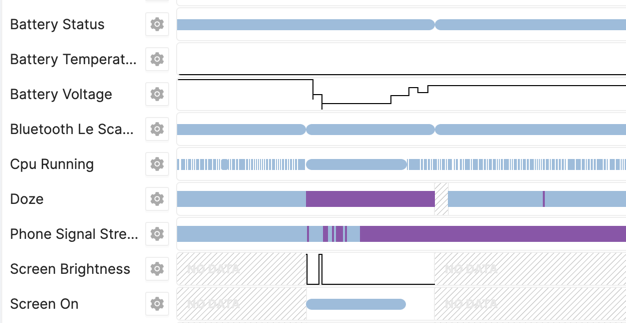February 2022
Android SDK Bort 4.0
Memfault's AOSP SDK "Bort" received a major update 4.0 with many improvements such as additional support for Android 12 and multi-user compatibility.
We added support for Custom Metrics so that devices can report product-specific numerical values, strings, and state transitions on regular intervals. Together with a growing set of built-in Metrics, this leads to a powerful combination of per-device debugging (e.g. correlation of CPU activity and battery voltage) and fleet-wide insights (e.g. "how many devices exceed 80% of their storage" or "What is the average battery discharge rate?"). The reported values contribute to the recently introduced Time-Series Metrics and Device Attributes.

Another rather advanced feature enables devices without direct Internet
connection to report crashes and metrics to Memfault. Data is packaged as .mar
(Memfault Archive) files and vendors may upload them at a later time or upon
request (e.g. downloaded periodically via USB or in a local network by an
auxiliary device). This allows vendors to use Memfault in scenarios with strict
security requirements.
Dashboard changes to charts
Memfault's Dashboard provides an overview of your fleet at a glance. We have updated the charts "Active Devices" (more sources used as signal) and "Software Versions" (only active devices considered) to better compare apples to apples.

The visible time range for "Software Versions" can now be changed from "2 months" all the way down to just "24 hours". Since the same chart is now being used on the Cohort details page, it not only allows you to see long-term trends, but also acts as timely signal to observe the effect of an ongoing OTA software rollout.
The charts "Seen Devices" and "Received Events" have been removed.
General
- Added: Ability to create Alerts on device threshold for Android projects
- Added: Memfault CLI with support for delta releases
- Added: Batch resolve button on issue list
- Improved: More details on notification emails for issues
- Improved: Search UI for issues and devices (now with multi-select) in several places
- Improved: Crash analysis on Android (empty oopses, handling of missing Java exceptions)
- Improved: Device search fields (e.g. "software version" allows for prefix and exact search, "device id" better handles large number of values)
- Improved: Qualcomm support (better exception unwind, improved
.xedprocessing, allow for reprocessing of queue,.xed/.xcdnow visible on device timeline) - Improved documentation: FAQ on integration of ARM Cortex-M, Note about Newlib C Assertion handler, more details on How to Organize your Devices using Memfault, many details on Memfault's Android SDK
- Changed: Several charts on dashboard (see highlight section above), also "Active Devices" shows "weekly" by default
- Changed: Layout of header part on Device Details page (Cohort no longer editable on top of page but next to other fields)
- Fixed: Unable to create new Custom Metric Charts
- Fixed: API incorrectly handles delta releases in some cases
- Fixed: UI glitches on tooltip for software version in device search
- Fixed: Inconsistencies in device event log
- Fixed: Email addresses for user invites were treated as case-sensitive
- Fixed: Issue search for "first seen"
- Removed: Cohort selector on issue list in device details
MCU SDK
In February, two SDK versions 0.28.2 and 0.29.0 were released. Here are some highlights:
- Updated nRF91 sample test app to be compatible with nRF Connect SDK 1.9 release
- Added a port to Particle's Device OS,
see
[ports/particle/README.md](https://github.com/memfault/memfault-firmware-sdk/blob/master/ports/particle/README.md) - Utility function
[memfault_base64_encode_inplace](https://github.com/memfault/memfault-firmware-sdk/blob/master/components/include/memfault/util/base64.h#L35)for base64 encoding data in place - More reboot reason options:
kMfltRebootReason_KernelPanicfor explicitly tracking fatal resets from within a OS or RTOSkMfltRebootReason_FirmwareUpdateErrorfor explicitly tracking resets due to firmware update failures or rollbacks
- Several internal improvements
Android SDK
We have published the Bort AOSP SDK 4.0 which includes:
- Additional support for Android 12 (all the way down to Android 8)
- Support for Custom Metrics (supporting
various system-wide built-in metrics
such as app versions, storage usage, temperature or selected system
properties), see
ReportingAPIs inreporting-lib - Support for devices without a direct Internet connection (see highlight section above)
- Update dependencies (Gradle, Kotlin, Android Gradle Plugin) and
compileSdkVersionof 31 - Several other improvements (multi-user support, various bug fixes, build improvements)
- Several fixes (SELinux violations on recent targetSdkVersion, race condition if started via ContentProvider query, missing DropBoxManager entry in rare scenarios)
- Unfortunately, two breaking changes